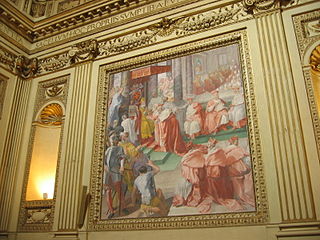 W
WApostolici Regiminis was a papal bull issued 19 December 1513, by Pope Leo X, in defence of the Roman Catholic doctrine concerning the immortality of the soul.
 W
WBenedictus Deus is a papal bull written by Pius IV in 1564 which ratified all decrees and definitions of the Council of Trent. It maintains that the decrees of the Council of Trent can be interpreted solely by the Papal office itself; and enjoins strict obedience upon all Catholics, forbidding, under pain of excommunication, all unauthorized interpretation. This was seen by Church contemporaries of Pius IV as an attempt to strengthen the influence of the Papacy against the rise of Conciliarism exemplified by the Council of Trent itself.
 W
WCaeca et Obdurata Hebraeorum perfidia was a papal bull, promulgated by Pope Clement VIII on February 25, 1593, which expelled the Jews from the Papal States, effectively revoking the bull Christiana pietas (1586) of his predecessor Pope Sixtus V. Prior to 1586, Pope Pius V's bull Hebraeorum gens sola (1569) had restricted Jews in the Papal States to Rome and Ancona.
 W
WThe College of Justice includes the Supreme Courts of Scotland, and its associated bodies.
 W
WCum ex apostolatus officio is the name of a papal bull issued by Pope Paul IV on 15 February 1559 as a codification or explicitation of the ancient Catholic law that only Catholics can be elected Popes, to the exclusion of non-Catholics, including former Catholics who have become public and manifest heretics.
 W
WCum nimis absurdum was a papal bull issued by Pope Paul IV dated 14 July 1555. It takes its name from its first words: "Since it is absurd and utterly inconvenient that the Jews, who through their own fault were condemned by God to eternal slavery..."
 W
WDecet Romanum Pontificem (1521), the papal bull excommunicating Martin Luther, bears the title of the first three Latin words of its text. It was issued on January 3, 1521 by Pope Leo X to effect the excommunication threatened in his earlier papal bull, Exsurge Domine (1520), since Luther had failed to recant. Luther had burned his copy of Exsurge Domine on December 10, 1520 at the Elster Gate in Wittenberg to indicate his response.
 W
WExsurge Domine is a papal bull promulgated on 15 June 1520 by Pope Leo X. It was written in response to the teachings of Martin Luther which opposed the views of the Church. It censured forty-one propositions extracted from Luther's Ninety-five Theses and subsequent writings, and threatened him with excommunication unless he recanted within a sixty-day period commencing upon the publication of the bull in Saxony and its neighboring regions. Luther refused to recant and responded instead by composing polemical tracts lashing out at the papacy and by publicly burning a copy of the bull on 10 December 1520. As a result, Luther was excommunicated in 1521.
 W
WInter gravissimas was a papal bull issued by Pope Gregory XIII on February 24, 1582. The document, written in Latin, reformed the Julian calendar. The reform came to be regarded as a new calendar in its own right and came to be called the Gregorian calendar, which is used in most countries today.
 W
WQuamvis ad amplianda is a papal bull issued by Pope Alexander VI on 1 June 1500 calling for a crusade against the Ottoman Empire in response to Ottoman invasions of Venetian territories in Greece. After requests for funds and military support from the German Reichstag were rejected, a universal tithe was instituted within the bull.
 W
WRegimini militantis Ecclesiae was the papal bull promulgated by Pope Paul III on September 27, 1540, which gave a first approval to the Society of Jesus, also known as the Jesuits, but limited the number of its members to sixty.
 W
W"Regnans in Excelsis" is a papal bull that Pope Pius V issued on 25 February 1570. It excommunicated Queen Elizabeth I of England, referring to her as "the pretended Queen of England and the servant of crime", declared her a heretic, and released her subjects from allegiance to her, even those who had "sworn oaths to her", and excommunicated any who obeyed her orders: "We charge and command all and singular the nobles, subjects, peoples and others afore said that they do not dare obey her orders, mandates and laws. Those who shall act to the contrary we include in the like sentence of excommunication." Among the queen's alleged offences, "She has removed the royal Council, composed of the nobility of England, and has filled it with obscure men, being heretics."
 W
WSublimis Deus is a bull promulgated by Pope Paul III on June 2, 1537, which forbids the enslavement of the indigenous peoples of the Americas and all other people. It goes on to state that the Indians are fully rational human beings who have rights to freedom and private property, even if they are heathen. Another related document is the ecclesiastical letter Pastorale officium, issued May 29, 1537, and usually seen as a companion document to Sublimis Deus.